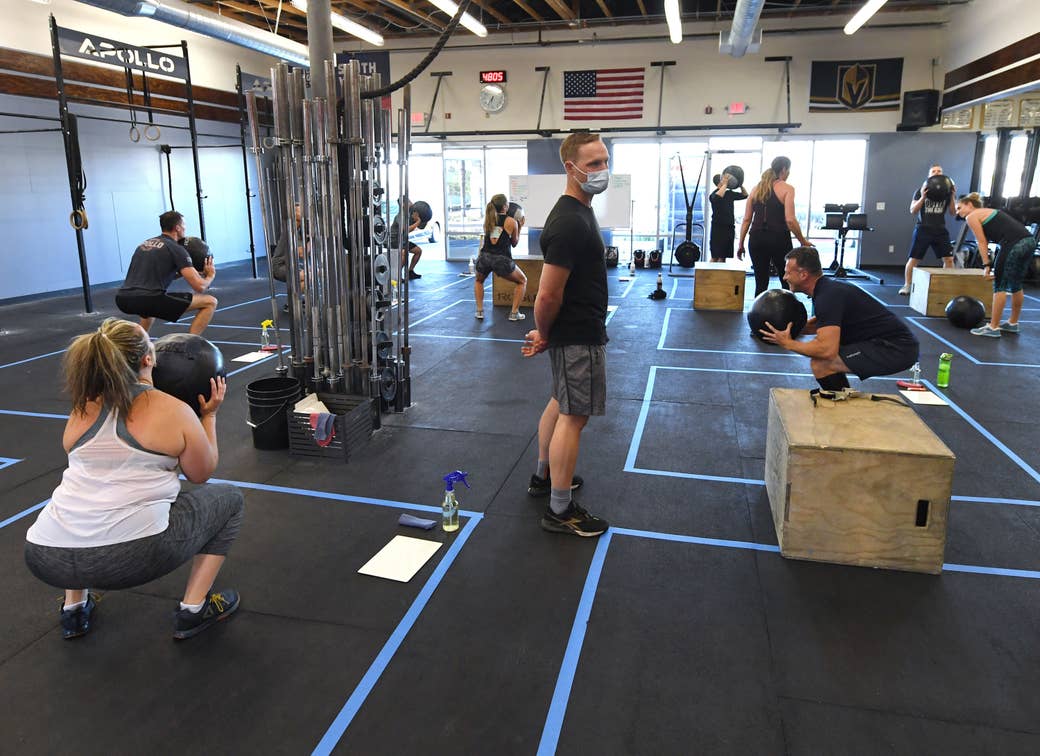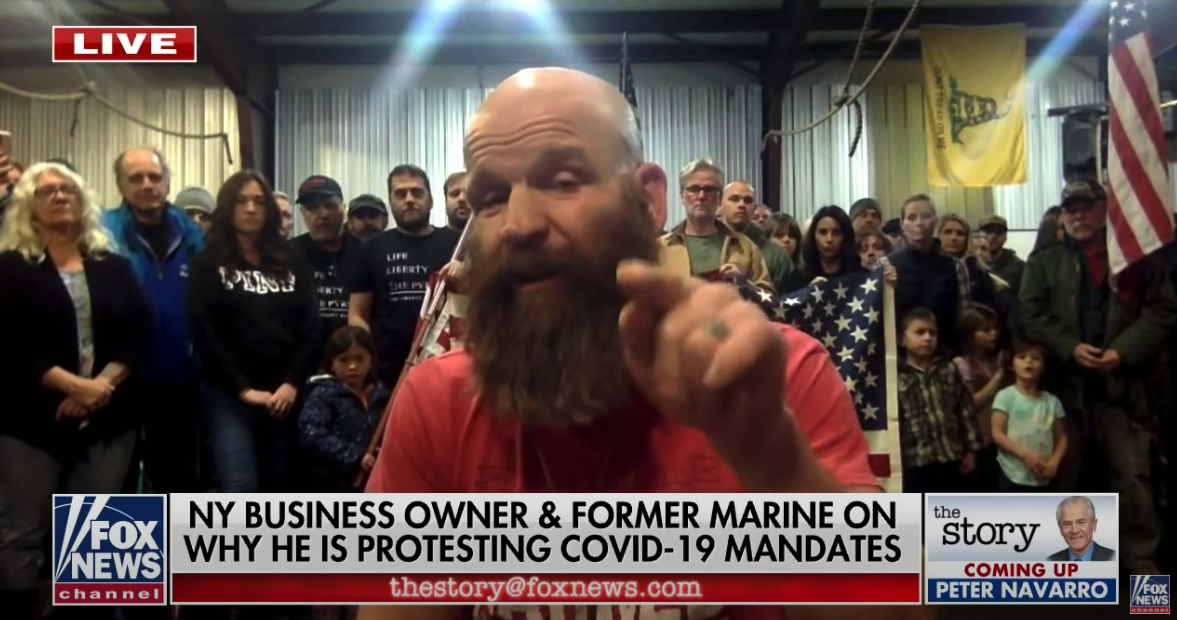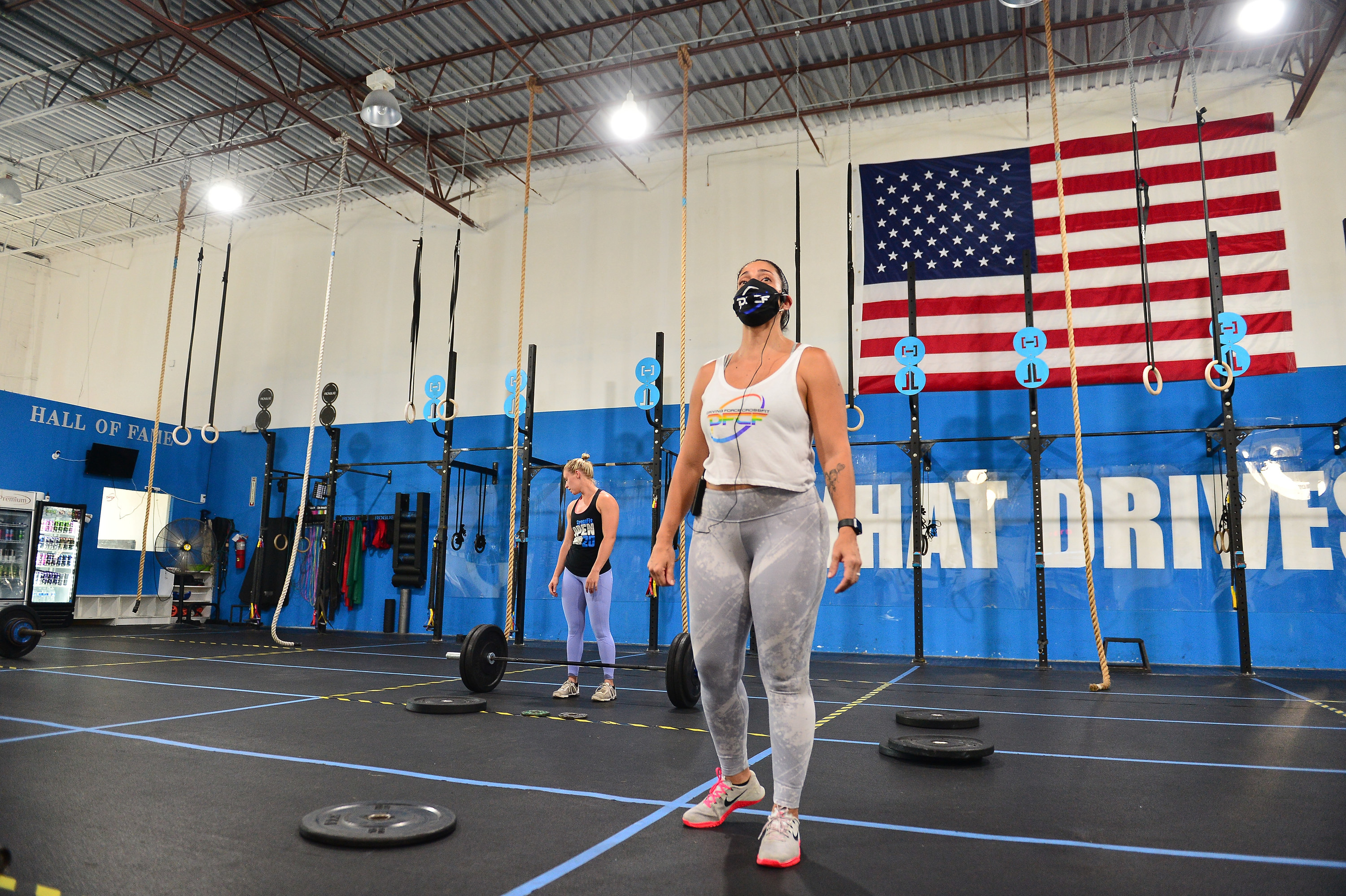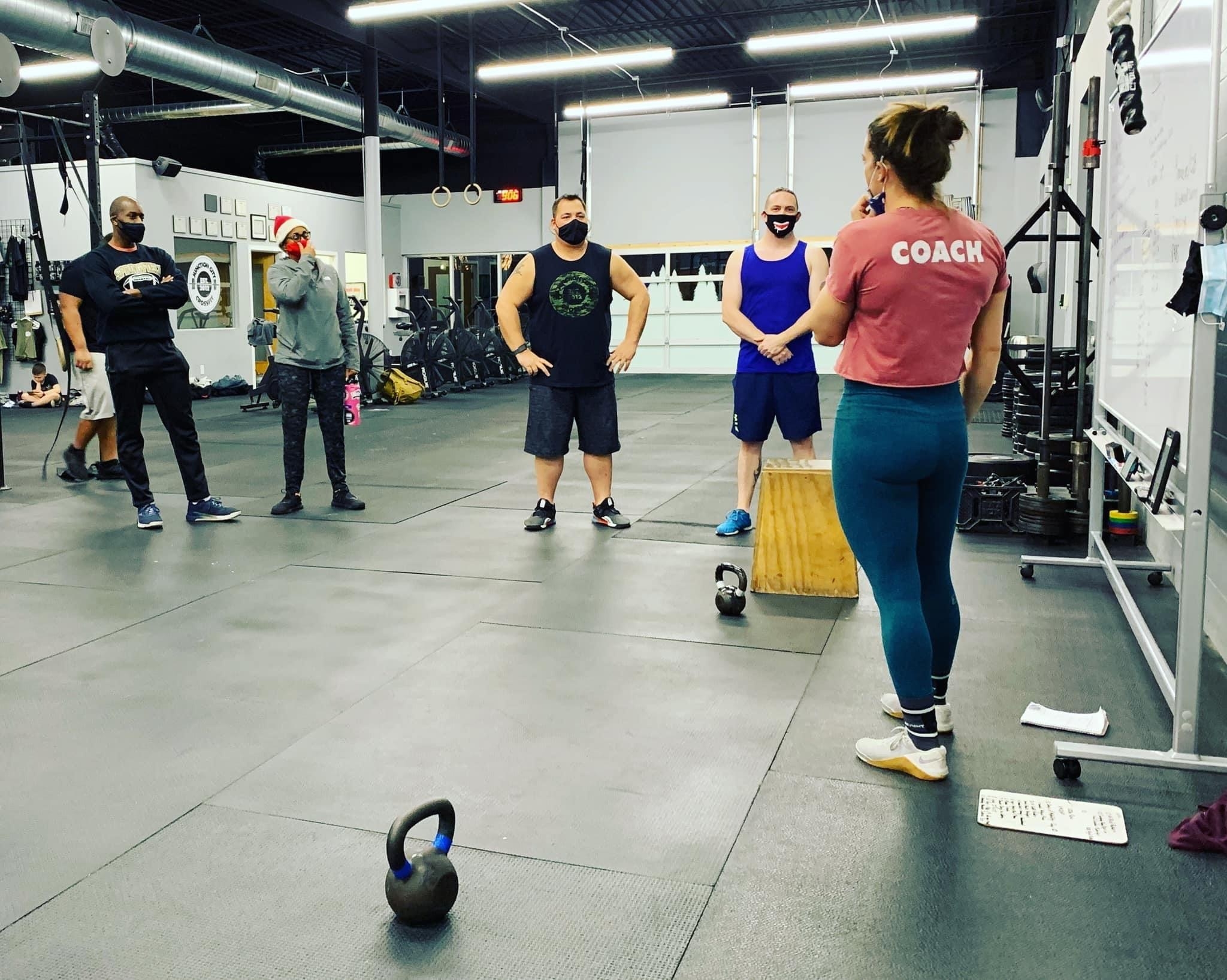
The journalists at BuzzFeed News are proud to bring you trustworthy and relevant reporting about the coronavirus. To help keep this news free, become a member and sign up for our newsletter, Incoming.
On the evening of Nov. 20, two sheriff’s deputies and a health inspector entered a facility in Buffalo, New York. The area was under an executive order barring nonessential gatherings of more than 10 people due to the coronavirus pandemic, but there were roughly 100 people inside the venue that night.
At first, the confrontation was tense but restrained. One man yelled that the officials were on private property and had to leave, but another man at least tried to seem persuasive. “We’re asking to appeal to your compassionate side,” he said to the officials.
Soon, though, the crowd grew angrier and started shouting: Where is the deputies’ warrant? Why is the health inspector hiding her name tag? If I’m supposed to be wearing a mask, then why don’t you arrest me? Growing rowdier still, they began chanting, “Get out!” as they pushed closer to the officials, who were inching back toward the door. The furious crowd followed them out into the parking lot and hoarsely screamed, “We will not comply!”
The scene of this tense standoff? A CrossFit gym.
A video of the incident went viral, drawing nearly a million views. On Nov. 24, the gym’s owner, Robby Dinero, appeared on Fox News, ringed in the background by roughly 35 unmasked people, including a few small children. He held up the $15,000 fine levied by the Erie County Department of Health in front of the camera. “Our freedom cannot end where people’s fear starts,” he said before ripping the document in half.
In terms of reach and influence in the fitness world, CrossFit is unparalleled. With roughly 6,700 affiliate gyms, the brand has more locations in the United States than Equinox, SoulCycle, and Orange Theory combined. With about the same number internationally, CrossFit is the largest fitness chain in the world.
But CrossFit is also unique for its hands-off corporate structure. To open an affiliate location, a gym owner needs only a location, proof of insurance, the $3,000 annual licensing fee, and a coach with a “level 1 certification,” which can be done over a weekend. Unlike under a franchise model, CrossFit gyms are largely free to make their own decisions about branding, equipment, facilities, coaches, training methodology, programming workouts, and hygiene practices.
As a result, CrossFit is divided on its response to the pandemic like no other fitness brand. The company has released no public health requirements for affiliates in part because of a lingering split in the CrossFit diaspora between those who believe in science and those who don’t.
To some prominent CrossFitters, the relative silence from such an influential company has put the community in danger.
“CrossFit HQ is in a position of authority, and they’re a loud voice,” said one leading, longtime CrossFit athlete who asked not to be identified because he feared being ostracized by the company. “There are a lot of people that are uncertain [about the risk of infection in gyms], but when a loud voice is speaking confidently, then it will sway you that maybe there isn’t a risk. And that’s the concern.”
In a statement to BuzzFeed News, CrossFit spokesperson Andrew Weinstein said its affiliates had faced tremendous pain due to lockdowns, which the company says have unfairly impacted gyms. “CrossFit strongly believes the best way forward is through engagement with policymakers, education about the importance of fitness to public health, and adhering to best practices established by [a] public health official,” Weinstein said. “We encourage all gym owners to comply with local laws and adopt best practices to protect their members, so we can emerge stronger from this pandemic together.”
But at a time when many gym owners are financially strapped and reconsidering the value of their affiliation, CrossFit is attempting to strike a delicate balance between advocating for gym owners to reopen safely and upsetting its sizable right-wing base by infringing on its sense of personal responsibility — a tenet of conservatism that’s historically been at the heart of the company mantra.
“They're dancing a razor-thin line,” said Pat Vellner, a six-time athlete at the CrossFit Games competition. “You don't want to alienate anybody, so you want to hear those voices that are like, ‘This is fucking stupid. Our gym should be open. This whole thing’s not real anyway.’ But you don’t want to fan those flames of conspiracy theories.”
So far, the company’s approach has been inconsistent. While it has said publicly that affiliate owners should follow local health guidelines, Dave Castro, the general manager of sport for CrossFit, who briefly led the company this year, reposted the Fox News interview with the Buffalo gym owner on his Instagram with the hashtag #SupportYourLocalBox. (Castro and Dinero didn’t respond to multiple interview requests, and the Instagram post has since been deleted.)
Just three days after the Fox interview aired, though, CrossFit announced that it had canceled the affiliation for the Buffalo gym — but not for breaking the law. An email came to light in which Dinero wrote to a customer who had requested a refund for an event that was canceled due to the pandemic: “I will refund your money as soon as you eat my ass you filthy, foreign, third-world piece of shit. Fuck you very much.”
The gym owner’s racist comments were too much for CrossFit, which has experienced massive upheaval and scandal this year after comments made by founder and CEO Greg Glassman about the death of George Floyd. That racist remark led to Glassman stepping down and selling the company. Now, new leadership is trying to rehabilitate CrossFit’s image from a hypermacho, white boys club to a more modern and inclusive space.
But amid a pandemic that is disproportionately hurting Black, Latino, and Native American people, CrossFit is struggling to appease those who are taking the coronavirus seriously and those who are ignoring it.
“At its essence, you know that inclusivity means something beautiful,” said Alyssa Royse, who owns Rocket Community Fitness in Seattle and whose open letter to the former CEO and subsequent disaffiliation helped catalyze the initial backlash against CrossFit. “But in practice, you can't be a place for everyone, because you can't be a place for entrenched racists and Black people, right? So, which type of affiliates do you want to have going forward?”
She added, “And if you're going to piss off 30% of your affiliates and lose them, which ones do you want to lose?”

Jason Fernandez is adamant that he takes the virus seriously. Fernandez — the co-owner of an affiliate in Virginia who also teaches seminars for CrossFit (but stressed that he wasn't speaking on its behalf) — said that his gym is cleaned multiple times a day, equipment gets wiped down before and after classes, and they’ve installed air filters.
But although he would intervene if someone were working out in a way where they might hurt themselves, if someone in the gym takes off their mask, he doesn’t ask them to put it back on. “I can't control every single person and every single move they make,” he said. “It’s just not realistic. It’s not practical.”
He added, “My ultimate stance is this: If people want to wear masks and stay home, I fully support that. If you want to get a vaccine, I fully support it. If you don’t want to, that is your personal risk assessment as a citizen of the United States, protected by the Constitution.”
Since its founding in 2000, CrossFit has developed a conservative following, especially within the armed forces. The training methodology first gained traction through police academies and military bases, and its most revered workouts are “Hero WODs” in honor of service members, firefighters, and police officers who have died.
With “intensity over volume” as one of the central tenets of its workout regimen, CrossFit quickly developed a particularly macho culture. Its pseudo official symbols became Uncle Rhabdo, a nod to the potentially lethal condition that can develop from overtraining, and Pukie the Clown, a mascot celebrating working out so hard that you throw up.
But CrossFit’s training methodology is also “infinitely scalable,” meaning it can accommodate anyone of any ability, body type, or level of experience. For that reason, it grew in many directions at once. On one hand, it became a professional sport whose flagship competition, the CrossFit Games, is streamed on CBS and offers millions of dollars as its prize purse. On another, it became a training method for people seeking to get into shape.
Part of its success comes from its followers’ infamous cultlike devotion — but even under Glassman, the company worked to expand beyond its initial base and promote a more progressive, welcoming image. In 2018, an executive was fired for tweeting that “celebrating ‘pride’ was a sin.” The following year, the company changed its policies to include trans athletes under rules similar to those used by the International Olympic Committee. Competitive CrossFit also includes and promotes a robust division for adaptive athletes. Before Glassman sold the company, he was specifically trying to recruit athletes who are older and less fit.
But at the same time, the company has periodically — and controversially — embraced its conservative roots, like when it announced that the winners of the 2016 Games would be given a Glock handgun.
The company’s image was thrown into chaos in June of this year when BuzzFeed News obtained audio of Glassman during a Zoom meeting of gym owners making racist and conspiratorial comments about George Floyd’s death and the protests for racial equality. In response, over 1,000 gyms disaffiliated with the brand, major sponsors fled, and elite athletes threatened to boycott the upcoming Games. Glassman stepped down and sold the company to new leaders, who apologized for his “incredibly insensitive and hurtful” comments about Black people.
But on that same Zoom call, Glassman had also spread wild conspiracies about COVID-19, something he’d been doing since the pandemic was declared. In mid-March, he posted an article to the company’s website, which is still available, estimating that there would be an eventual 10,000 deaths from COVID and arguing that “locking down the world ... may be totally irrational.” A week later, Glassman gave a lecture, which is also still available, claiming that CrossFit has the solution to chronic disease and citing a statistic that half of the 20,000 expected deaths in the UK would be from people who were going to die within the year anyway.
It wasn’t just Glassman. In May, when a fan posted on Instagram that athletes’ health and safety should be the priority for an upcoming competition, the official CrossFit account responded: “toughen up.”
Marjorie Taylor Greene, a believer in the QAnon mass delusion who was just elected to Congress, is a former CrossFit gym owner herself. Last month, she complained on her first trip to DC as a representative-elect that she had been forced to work out in her hotel room because gyms weren’t allowed to open (which was not the case). “I work out everyday in a CrossFit gym that is open. With people,” she wrote on Twitter, complaining of Democrat tyrannical control. “Gyms are small businesses that have been devastated by the government mandated shut downs.”
But whether from Greene or Dinero in Buffalo, Glassman’s Zoom call in June revealed that the anti-lockdown attitude was coming from the very top.
“I was asked by the Italians, 'What would you do [about the pandemic], coach?'” Glassman said on the call. “And I said, 'I would agree to any restrictions put on me by the health authorities, and I would open my gym, and then 10 minutes later I would do whatever the fuck I wanted. That's what I would do.'"

Other fitness companies have taken a less cavalier — and more standardized — approach to health and safety procedures during the pandemic. All Equinox locations are operating at no more than 33% capacity and with mandatory temperature checks. At 24 Hour Fitness’s nearly 300 clubs nationwide, masks are required at all times. And to enforce the rules at its 2,400 gyms, Anytime Fitness monitors on-site cameras, deploys undercover customers, and uses peer-to-peer spot checks, where a gym owner visits another in her area to ensure it’s following health guidelines.
In addition to ensuring their members’ safety, following the safety guidelines makes business sense, according to Chuck Runyon, the CEO and cofounder of Self Esteem Brands, Anytime’s parent company. In Minnesota, where the company is headquartered, gyms are currently at 25% capacity. “We will reduce that, and if our members need to wear a mask during a workout, we would do that, too,” he said. “We’ve told the governor, ‘We just want to make the safest environment possible,’ so we’ll make those considerations.”
Unlike Anytime Fitness, which has made its clubs’ check-in logs available to health researchers, CrossFit doesn’t collect data, conduct its own research, or engage in proactive contact-tracing, even in the gyms that are running the company’s coaching certification seminars.
However, there’s a fundamental difference between Anytime and CrossFit. “CrossFit is an affiliate model, not a franchise model,” said Kate Alexander, CrossFit’s director of affiliate success. “We don't need to determine how or why people run their businesses the way they do.”
However, that’s not necessarily the case when it comes to insurance liability, where at least one clear limit has been set. In an April email sent to a gym owner and shared with BuzzFeed News, CrossFit’s Risk Retention Group — which describes itself as “insurance for the CrossFit community, by the CrossFit community” and insures about 2,700 gyms in the US — said gym owners wouldn’t lose coverage for not following health guidelines but could lose it if they opened without authorities’ permission.
Though the company told BuzzFeed News that it “encourage[s] all gym owners to comply with local laws and adopt best practices to protect their members,” there is no national, standardized list of recommendations that gyms must follow. In this vacuum, some owners, like the one in Buffalo, are choosing to ignore health laws and guidelines, while others are coming up with their own best practices.
Bill Ohlsen is the owner of CrossFit Wynwood in Miami; his son, Noah, is an athlete who competes in the CrossFit Games. In June, Ohlsen reopened his gym with a tribute workout to George Floyd and a full suite of precautions: 10-by-10-foot personal boxes, designated vacant space down the gym’s middle and perimeter, longer class times to allow for deep cleaning between sessions, and periodic electrostatic antibacterial and antifungal fogging of the facility.
These policies are time-consuming, expensive, and above and beyond what’s required by the county, but Ohlsen believes they’re necessary for everyone to feel safe, himself included. “People talk to me, even with a mask, and if they’re 2 feet away, I back up,” he said. “I just don't want the exposure. I'm 65 — 66 in a couple of weeks — and even though I’m very fit, I don’t need the risk.”
His experience is indicative of the downside of CrossFit’s hands-off policy: Regardless of whether affiliate owners want to lobby their city’s health department, beef up their safety protocols, or sue their local government, they’re essentially on their own.
As a result, it’s not surprising that other gym owners have ignored the rules altogether, though Ohlsen believes their approach is counterproductive. “I just think they’re idiots,” he said. “If our people don’t feel safe, they’re going to say, ‘I’m putting my membership on hold,’ or ‘We’re going to another gym.’”
After reopening, Ohlsen said, he picked up two new members, who had left their old fitness center because it wasn’t following the health restrictions. Nearly half of CrossFitters in a recent survey said they’d leave their gyms for the same reason. However, in yet another sign of a split membership base, more than one-third of respondents said they’d stop going to their gym if wearing a mask indoors were required.
For certain affiliates, breaking the rules can even be more lucrative than following them. A member of Diablo CrossFit in Northern California started a GoFundMe when Craig Howard, the owner and an official liaison between the company and affiliates in the region, was fined $1,750 for continuing to operate indoors. After it raised $22,350, Howard pledged $10,000 to other struggling gyms. (CrossFit confirmed Howard is no longer the company’s liaison in Northern California. He did not respond to requests for comment from BuzzFeed News.)

Much like the patchwork of state and local laws dealing with the pandemic, there is often little correlation between a gym’s restrictions and the severity of the virus in its area. But whether members will actually follow any rules can be arbitrary.
Christina Spencer is the co-owner of Junction City CrossFit in Kansas, where many of the members are soldiers stationed at the nearby Fort Riley. On Nov. 25, the base banned service members from visiting off-site gyms and required that masks be worn at all times, even inside cars. With that as a baseline, Spencer said that her other members, including the soldiers’ spouses, were happy to comply with the comparatively minor mask mandate inside the gym. “Because we're so close to the base, everyone’s just like, ‘Oh, this is what we do,’” Spencer said. “But I think if you go 30 miles in any direction, you’d probably see some pushback.”
In this sense, CrossFit could help gym owners by setting minimum safety standards, perhaps with a PR push from beloved Games athletes. Then, gym owners could use the company as a scapegoat for potentially unpopular decisions.
At a broader level, the company could cull gyms that might damage the national brand or spark controversy, as the incident in Buffalo shows — but doing so would require CrossFit to hold owners accountable for violating health guidelines as much as it does for those who make racist comments.
Still, some gym owners are pleased with a few of the company’s decisions, including Royse in Seattle, who, like other owners interviewed for this story, believes her facility can be operated safely with the right measures in place. Even if CrossFit hasn’t set requirements for its gyms, she was happy to see the company say publicly that it was encouraging affiliate owners to follow local health guidelines. “I suspect that might have been a stand that their lawyers advised them to take,” she said, “but if your brand is dependent on people believing that you're interested in health and wellness, that's the right stand to take.” (A CrossFit spokesperson denied that the company has talked to its lawyers about encouraging gym owners to adhere to regional laws.)
In November, CrossFit joined the Community Gym Coalition, a bloc of major fitness companies that is lobbying the federal government for $30 billion in relief. Currently, its bill doesn’t have a sponsor in Congress — but whether it succeeds or not, it allows CrossFit to advocate for affiliates without having to wade into the controversial politics of science, masks, and shutdowns.
But while some CrossFitters are trying to ignore the pandemic, others are working on their own to respond to it.
Just south of Denver, CrossFit WatchTower owner Kevin Ogar has extended hours to accommodate his members, about 15%–20% of whom are adaptive athletes, including some with cerebral palsy, traumatic brain injuries, and paraplegia. Some have had seizures while working out in masks, so Ogar has accommodated them — and anyone else who wants more space — by adding to the schedule an “open gym” where people don’t need to take a class and can work out on their own. “I kind of sit at the gym all day now and allow people to come in on off-hours if they're worried about being around crowds,” he said.
In line with the current guidelines, Ogar said he’s also wiping down equipment after each use and operating the gym at 10% capacity.
Ogar is an official liaison between CrossFit and its affiliates in Colorado, Utah, Nevada, Arizona, and New Mexico, and he’s spoken to a few gym owners who aren’t complying with the rules like he is. He acknowledges that while he shares a brand with these other owners, he cannot control them. “It’s their business,” he said, “and while it’s not really what we recommend them doing, they have the freedom to make that choice.”
But after a particularly turbulent year for the brand, Ogar — like the company — has his limits on what is acceptable behavior for his fellow CrossFitters. “Pushing back against what they feel to be unfair mandates isn't as bad as being overtly racist towards someone,” he said. “I don't think there's any question between which one of those two things is worse.”●
